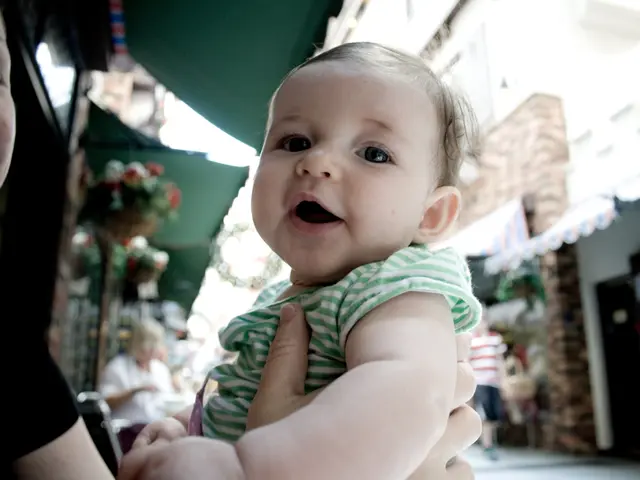Perils facing children on social media platforms and measures to safeguard them
In today's digital age, if social media platforms were actual locales, many parents would consider them off-limits for their kids. Yet, despite laws preventing data collection from children under 13, our research reveals that kids as young as 4 are using social networking sites daily. To uncover the truth about childhood social media usage and the associated risks, we polled over 2,000 children and their parents or guardians in the US and UK, revealing some eye-opening facts.
Our findings paint a picture of how frequently kids use social media, the perils they encounter, and the approaches families take to ensure online safety.
Some 4-year-olds spend 21 minutes a day on social media
While approximately a quarter of parents restrict their 4 to 13-year-old children from having social media accounts - 29% in the US and 21% in the UK - over half of these kids actually use social media. US kids, in particular, are more likely to be on social platforms, with 63% having accounts compared to 53% of UK children. These young social media aficionados spend an average of 28 minutes on social media each day.
Notably, even 4-year-olds who use social media platforms log an average of 21 minutes of daily screen time. TikTok emerges as a major concern as research shows that 68% of American children under 13 who use social media have TikTok accounts, despite the app's recommended age of 13. In the UK, 30% of 5 to 7-year-olds are reported to be using TikTok. Globally, kids now spend between 75 and 113 minutes on TikTok daily.
Are parents aware of their kids' online activities?
Nearly all parents monitor their children's online activities to some extent, with 54% checking in daily or more than once a day. Their methods range from checking phones and tablets to limiting access and watching their children while they surf the web or use parental control software or apps.
When it comes to online activities parents deem acceptable, 87% allow their children to watch videos on YouTube and Netflix, 83% permit gaming, while 28% have no qualms about granting access to the internet for reading articles. With only a small percentage of parents allowing their children formal social media accounts, it's possible that many kids are using such platforms without parental knowledge or supervision, logging on when they've been given internet access for other purposes.
Potential benefits of social media for children
Before diving into the drawbacks of social media, let's consider some potential advantages:
- Connection and community: Social media enables kids to connect with friends, family, and online communities, especially those in faraway places. This can be particularly beneficial for children who struggle with social interactions in real life or hail from geographically isolated communities.
- Creativity and self-expression: Social media offers a platform for kids to showcase their artistic talents through various formats like writing, photography, music, and coding. Sharing their creations online can boost confidence and help build a sense of identity.
- Digital literacy and skills: Social media exposure can help children develop crucial skills like critical thinking, information evaluation, and responsible online behavior.
- Learning and discovery: Social media can be an educational tool, providing access to diverse information and perspectives on various topics. Kids can follow educational channels, participate in online study groups, or discover new interests through shares from friends and others.
- Empowerment: Social media can empower children to become active citizens, advocates, and change-makers, raising awareness about issues they care about and connecting like-minded individuals.
Risks children face on social media
While parents worry about cyberbullying, child grooming by online predators, offensive content, and cyberstalking or harassment, young children surveyed report being most disturbed by encountering rude language or swearing online (34%), scary videos (22%), and scary images (19%).
In fact, 22% of children admit to being bullied online, with 17% reporting that strangers have asked them which school they attend, and 14% saying they've been asked for their home address.
The platforms where children most often experience these negative scenarios include YouTube, Facebook, TikTok, Roblox, and Instagram in the US, and Roblox, YouTube, TikTok, Fortnite, and Facebook in the UK.
Key risks to children on social media
Inappropriate content
Exposure to graphic, violent, and disturbing images and sexually suggestive material can have detrimental effects on children, leading to anxiety, sleep disturbances, and even trauma.
Cyberbullying
Online harassment and bullying can inflict severe emotional harm, potentially leading to anxiety and depression. Parents should be vigilant in monitoring their children's online activities to detect signs of bullying and provide the necessary support.
Privacy concerns
Children may unwittingly share sensitive personal information online, making them vulnerable to predators, impersonation scams, or identity theft. Parents should educate their children about privacy and set high privacy settings.
Mental health issues
Prolonged screen time and unrealistic online comparisons can contribute to feelings of inadequacy, low self-esteem, anxiety, and body image issues. Encourage balance between online and offline activities and open communication.
Online grooming and inappropriate behavior
Predators can exploit children on social media, posing as peers or friends to gain their trust, share inappropriate content, manipulate them emotionally, or even attempt to lure them into meeting offline, putting them at risk of physical harm.
Kids feel the need to lie online
Given that social networking sites don't allow children under 13 to access them, a quarter of our child respondents admitted to lying about their age on social media. One in six youngsters also lied about their address or location, what they were doing, and their appearance.
While we didn't inquire about reasons for lying, the fact that some children lie to protect themselves suggests that they feel anxious about sharing personal information with strangers online and are responding to pressures around conforming to unrealistic societal standards and seeking validation through social media.
With young children's social media use only anticipated to rise, teaching them about online safety has never been more important.
Education about online safety
According to parents, they are primarily responsible for educating young children about online safety (76%), with over 84% of children reporting that their parents and guardians have taught them about internet safety. Although only a small number of parents believe that schools and social media companies should be most responsible for teaching children about online safety, around half of children have learned about it from schools.
Schools are expanding digital literacy and online safety programs, supported by initiatives like the Digital Equity Act in the US, which funds states for digital skills training, cybersecurity education, and improved technology access.
Top 5 tips for keeping children safe online
- Set up parental controls: Schooling institutions and social media companies offer parental control features, empowering parents to limit screen time, control content, and block inappropriate apps.
- Foster open communication: Encourage your children to share their experiences online, making them comfortable discussing any unwelcome or inappropriate content or behavior, as well as signs of cyberbullying.
- Remind them not to befriend online strangers: Educate your child about the dangers of engaging with strangers online, emphasizing the importance of not providing personal information and not meeting strangers in person.
- Set safe usernames: Help your child pick usernames that do not reveal personal information, such as their name, date of birth, or school.
- Utilize a Virtual Private Network (VPN): VPNs encrypt online traffic and provide added privacy and anonymity by assigning a new IP address, making it harder for strangers to track your child.
Read the full report for more detailed insights into child social media usage and online risks. By staying informed and vigilant, parents can better protect their children and promote healthy, positive social media experiences.
- Despite parental restrictions and laws, our findings reveal that some 4-year-olds spend 21 minutes a day on social media platforms like TikTok.
- Parents who allow their children to use social media platforms may be unaware of the risks associated with these sites, such as encounters with rude language, scary videos, and inappropriate content.








